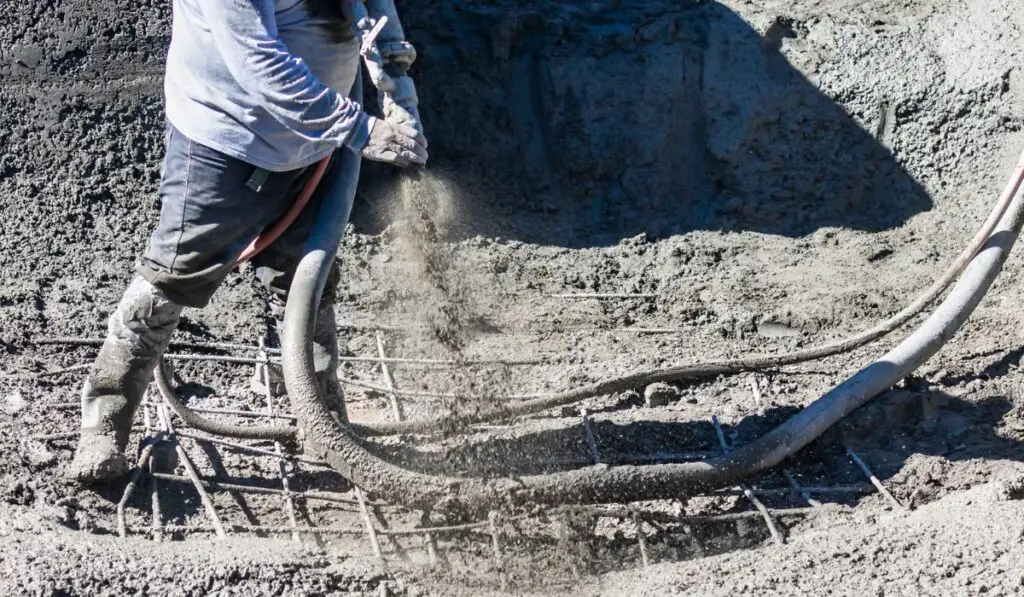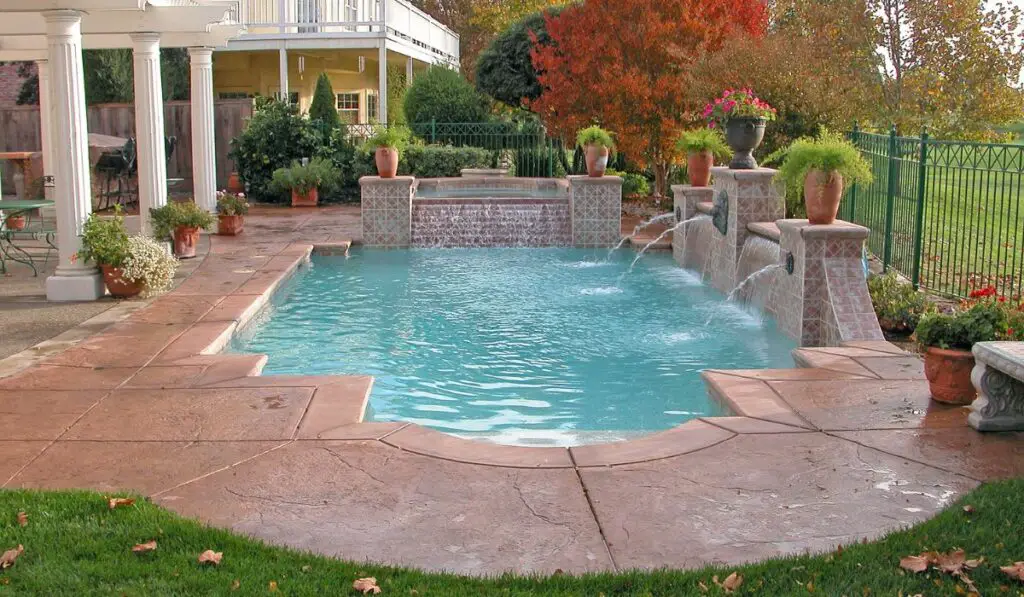There’s nothing better than taking a dip in a pool on a hot summer day. If you’re planning on building a pool in your yard to beat the heat, you may have heard the term “gunite” a few times. But what exactly is a gunite pool? Should you opt for one, or stick to the more traditional choices?
Gunite pools are built with a concrete mixture of cement, water, and sand. They’re completely customizable and can be constructed in any shape, size, and depth imaginable. However, they have a long instal time and need to be cleaned and maintained regularly to achieve their reported durability.
Gunite pools are incredibly popular thanks to their versatility and durability. For this reason, they’re also one of the most common pool types in both resorts and homes. Let’s look at what exactly a gunite pool is, whether the material is the same as concrete, how gunite compares to other materials, and how to maintain it properly.
What Is a Gunite Pool?

Renowned for its dependable and reliable structural strength, gunite is a concrete mixture of cement, water, and sand that’s applied using a high-pressure hose. Once the material dries, it becomes rock hard and forms a solid, stable structure.
Gunite has been used in pool construction for decades, where it’s always paired with steel and then finished with a coat of plaster. Because of its versatility, longevity, and durability, the material has become the standard for both residential and commercial swimming pool construction.
If you want to make a beautiful and durable addition to your backyard, then it may be better to opt for a gunite pool over other types. While vinyl liner and fiberglass pools boast lower initial costs and a quicker installation time, the finished product usually falls short of a gunite pool with the same dimensions.
Gunite pools also offer a wide range of design options. Whether you want a pool with sharp angles, smooth curves, or both, you’ll be able to achieve even the wackiest designs with gunite. From elevated spas to beach entries, the material also allows you to add whichever design features spark your interest.
With gunite, you can build a private resort in basically any shape, depth, size, and configuration to suit your backyard, lifestyle, budget, and style preferences.
Is Gunite the Same as Concrete?
It’s important to understand that gunite is essentially a type of concrete. However, the materials differ in two important ways.
Firstly, concrete uses both small and large aggregates, while gunite only consists of small particles.
The second difference comes down to when the crew adds water to the mixture. In concrete pools, the concrete blend is mixed with water before it arrives at the construction site, where it’s then poured into a preformed space to build your pool.
On the other hand, gunite arrives at the construction site as a dry mix and is only mixed with water at the point of delivery. Workers use a high-pressure hose to spray the blend over a rebar framework, which makes the material highly flexible and durable as well.
Since gunite is not poured like regular cement, it can easily be molded to build in-ground pools of almost every shape imaginable.
How Is a Gunite Pool Made?
Building a gunite pool is a lengthy and complex process. First, crews excavate a hole for the new pool. Next, they install steel rebar that extends throughout your entire pool and the spa (if you’ve planned to install one). Extra steel is then added to areas that need stronger reinforcement, like a free-standing raised wall or a deep end.
Set on solid concrete blocks, workers suspend the cage a few inches above the ground, so there’s plenty of space to add gunite. The mixture is then sprayed through a high-pressure hose onto the steel, forming the dense pool walls and floor.
Once the gunite dries or cures completely, workers add plaster to complete the construction. Composed of marble dust and cement, the smooth blend might also have colored quartz aggregate, enhancing the aesthetics and durability of your pool.
There are several other important elements that go into constructing a gunite pool, such as perimeter coping, tile, electric, and plumbing. However, what sets the pool apart from other kinds is the unique mixture of steel, plaster, and gunite — and the design versatility and durability that comes with it.
How Gunite Compares to Other Materials
Before you install a gunite pool, it’s important to understand how gunite compares to other materials:
Gunite
The incredible versatility of gunite allows you to build a pool of just about any shape imaginable, while its durability ensures you get a pool that will last for decades. With gunite pools, you can also choose from a wide range of finishes and opt for the shade that best compliments your outdoor living space.
You can even go for a glass or pebble finish if you want to give your pool a truly unique and high-end look. Gunite’s flexibility means you can add several different features to your pool as well, such as custom steps or a few dozen waterfalls if you so wish.
Fiberglass
You can build fiberglass pools in almost every shape and size imaginable. Like gunite pools, you can also heat these pools in the winters or install fiber optic lights to swim under the stars.
Fiberglass pools have a very quick installation time; you can even install them within a few days. However, the final time frame depends on how long it takes to excavate a hole in your backyard and complete all the electrical work.
Because they’re so smooth, these pools are also more resistant to algae growth and able to maintain more stable pH levels. Lastly, fiberglass pools don’t need any liner replacement or resurfacing.
Vinyl
There are several advantages to building a vinyl liner pool in your backyard. They’re incredibly flexible and don’t crack like concrete pools. They’re also very smooth and offer unlimited sizes, shapes, and design options to complement your outdoor decor.
Vinyl pools are generally less expensive than gunite and fiberglass pools. You can also change the liner over time to enhance the aesthetics and overall visual effect of the pool. However, keep in mind that the cost of the vinyl liner will depend on its thickness, size, pattern, and shape.
Like all in-ground pools, you can add several different features to a vinyl pool as well, including waterfalls, laminar jets, spas, heaters, decking, and lighting effects.
What Type of Water Is Best for Gunite Pools?
It’s best to add mineral water to your gunite pool as it’s the gentlest on both our bodies and our pools.
While saltwater also feels soft and gentle on our skin and clothing, it’s incredibly corrosive. Salt in your gunite pool can damage essential pool components, such as patio furniture, ladders, and handrails, and even corrode essential internal equipment, such as the pump and motor.
Mineral water contains sodium chloride, potassium chloride, and magnesium chloride. All three minerals work together to eliminate bacteria and algae, keeping your pool clean and completely safe to swim in.
Adding mineral water to your pool will also reduce your chlorine usage by around 50%. The water in a mineral system pool feels soft and silky as well, while its low chlorine levels prevent issues commonly found with traditional chlorine pool systems, such as itchy eyes, damaged hair, and dry skin.
The reduced chemicals in a mineral pool system will protect your pool components from wear and tear as well. This also means that, unlike with a saltwater pool, there won’t be any chemicals that will corrode your clothing, metal, or concrete.
What Is the Maintenance Process of a Gunite Pool?

It’s essential to clean every swimming pool, but the maintenance process is especially important with a gunite pool. Here’s how you can clean and maintain your gunite pool:
Clear All Debris
It’s important to remove all the debris floating in your pool before moving on to any of the major pool cleaning and maintenance steps. Some debris will settle on the pool floor while some will float on the surface of the pool.
It’s advisable to first thoroughly scrub the pool floor and walls. It’s also better to use the vacuums and cleaners recommended by your swimming pool manufacturer.
Get the Best Pool Filter
Purchasing a high-quality filtration system is one of the best ways to keep your pool water clean and clear. The filter will remove debris and any other harmful chemicals present in your pool water.
If you have an old pool or are frequently dealing with algae growth, then it may be time to upgrade your filtration system.
Maintain Chemical Balance
Swimming in a pool with an incorrect pH can lead to skin rashes, damaged hair, and other harmful consequences. A chemical imbalance can also corrode your swimming pool equipment.
A well-balanced pool has just the right level of alkalinity and calcium hardness. Most pool balancers (on Amazon) are readily available in the market, and you just need to follow the steps written on the pack to correct your pool’s chemical balance.
Add Algaecide
If algae growth remains unchecked, one small colony can infest your entire pool very quickly. Make sure you properly use algaecides (on Amazon) to prevent bacteria and algae growth.
It’s advisable to add algaecide to your pool every week to keep things under control. However, keep in mind that your pool will be unusable for a few days after you add the chemical.
